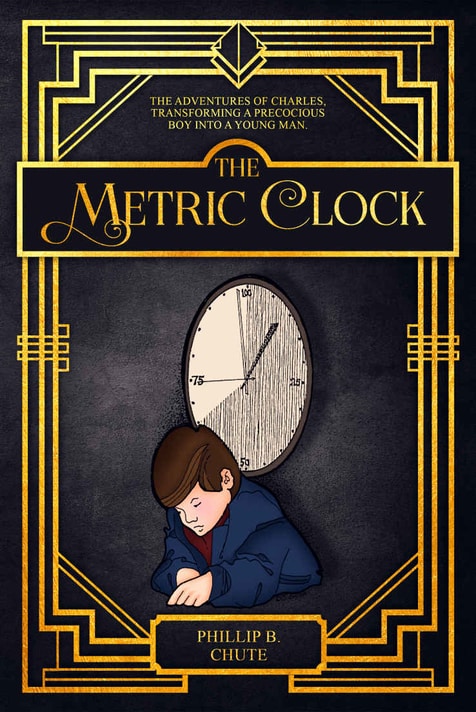
An expansive glimpse into the past reveals the perils, joys and eternal marks of childhood in The Metric Clock: The Adventures of Charles, Transforming a Precocious Boy into a Young Man by Phillip B. Chute. A classic coming-of-age story boasting plenty of original twists and evocative moments, this novel builds slowly, but delivers a powerful message with grace and subtlety.
An unexpected trip to Canada pulls young Charles into his own independence, as well as a deeper appreciation of family, legacy, and the distant figure he calls father. Wrestling with his own sense of self and manhood, while simultaneously discovering the varied shapes of affection and relationship, Charles is a dynamic young figure, one who is well-supported by believably penned companions along the way.
Writing with a strong air of nostalgia, as well as evocative imagery and powerful personal reflections reminiscent of Thomas Wolfe, Chute has a firm grasp of nuance in language, emotional complexity, and the swirling eddies of energy in conversation. The deep exploration of childhood, driven by narration that reveals Charles to be a complex and multi-dimensional character, is compelling in a way that many authors fail to capture. Shown in an authentic light, with all his curiosities and ignorance and questions laid bare, readers get to know him intimately. Even the simplest, seemingly innocuous anecdotes in the narration help shape Charles into a tangible and fascinating protagonist.
Aside from the pastoral plot of self-discovery, there are larger themes at play, and much higher stakes. Navigating the inevitable passage of time, the fading of great love, the pain of blurred memory, and the indelible scars of childhood experience, the characters of this novel are perpetually reckoning with heavy issues. This heaviness is beautifully balanced with the charming relationship between Charles and Mary Ann. From the opening pages, readers are granted some sense of relief that their long tale will end in seeming happiness, and it is clear that their connection lies at the heart of this story. Whenever there is a lull in the plot, their bond seems to appear in some form, endearing and fluid and pure, including one of the most memorable lines in the book: “Boys and men are always in trouble or getting killed. I hope that you won’t die on me before we grow up.”
From a storytelling perspective, this novel is remarkably well done, but the technical execution could be improved. There is the occasional grammatical error, missed comma, misspelled word/homonym, or inexplicable hyphen that could be easily polished away with a basic proofread. At a more in-depth level, some of the sentence structures feel unnecessarily convoluted, and while there is some colloquial charm in a stream of consciousness passage, the pace noticeably slows in these sections. There are also some matter-of-fact or on-the-nose descriptions that stand out even more because the vast majority of lines feel carefully constructed.
As a whole, the writing is lyrical and informally poetic, honest and touching. The themes of innocence, loss, love, and the insight of age are complicated subjects that Chute deftly dissects, making The Metric Clock a worthwhile and inspiring endeavor.
Book Links
STAR RATING
Design
Content
Editing
Get an Editorial Review | Get Amazon Sales & Reviews | Get Edited | Get Beta Readers | Enter the SPR Book Awards | Other Marketing Services























Leave A Comment